Younger consumers and entrepreneurs prefer using the internet for purchasing and selling, rather than visiting brick-and-mortar stores. This shift in consumer behavior underscores the importance of top-tier eCommerce frameworks. Each eCommerce site relies on a robust platform, and by 2026, global eCommerce sales are projected to surpass a staggering $8.1 trillion.
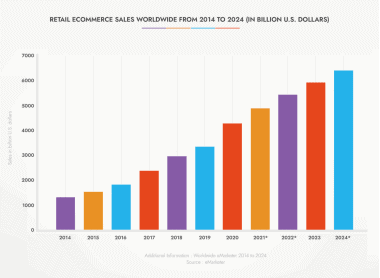
While many are familiar with the concept of online shopping, managing an eCommerce website can be quite daunting. A frequent question that arises is, “How do I select the ideal eCommerce platform for my business?” This stems from the understanding that each business is unique and there’s no universal solution.
To start, it’s essential to assess your business needs and select a plan tailored to your online venture. However, before delving into the best eCommerce frameworks, it’s important to understand the term “eCommerce framework” and the various types available. This foundational knowledge will assist you in seeking guidance when faced with pivotal decisions.
What Does an eCommerce Framework Mean?
Many individuals confuse the term “eCommerce framework” with programming frameworks. While there are similarities, they aren’t identical. An eCommerce framework is software designed specifically for creating eCommerce websites. These frameworks are developed on foundational programming frameworks. They establish the fundamental structure of a site and ensure its smooth operation with specialized functions such as:
- Strong and reliable design elements
- Maintenance and security services
- Product viability
- Infrastructure of website
- Analytic functionality
- Operational functionality
- Design and development
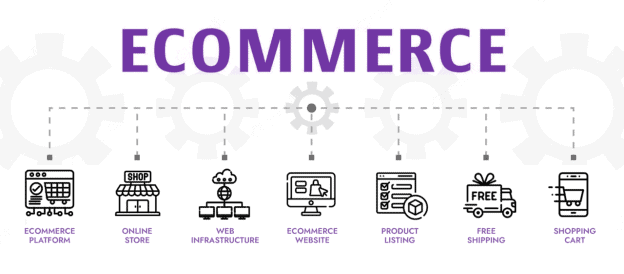
Ecommerce website designers craft visually engaging and functional online storefronts. Ecommerce frameworks offer them the structural blueprints to ensure stability and scalability.
Types of eCommerce Framework
As the digital marketplace evolves, selecting the right foundation for an online store becomes paramount. eCommerce frameworks, integral to this foundation, come in various forms, each catering to distinct business needs and technical requirements. Understanding these different types is crucial for entrepreneurs aiming to carve a niche in the online retail space.
Open-Source eCommerce Framework
Open-source eCommerce frameworks grant users the ability to access and modify their software’s source code. Such flexibility provides businesses with ample opportunities to tailor the system to their preferences. While open-source ecommerce platforms are ideal for businesses equipped with dedicated teams of designers, developers, and website managers, it’s worth noting that these free solutions typically don’t offer technical support.
| Benefits | Drawbacks |
| Unlimited personalization options | You are the only person responsible for installing software updates and security patches |
| Support from community of designers | Dependence on developers to make changes and adjustments |
| There are extra expenses that are not usually mentioned or included in the starting price | |
| Softwares are generally complicated |
SaaS eCommerce Framework
A Software as a Service (SaaS) eCommerce platform functions on a subscription basis. With this model, users opt to pay for and utilize software that the vendor maintains, rather than outright purchasing the software. This framework is favorable for rapidly scaling businesses, though the cost typically rises as the business expands.
A notable advantage of SaaS frameworks is the inclusion of technical support within the subscription, eliminating the need for businesses to maintain an in-house team of designers and developers.
| Benefits | Drawbacks |
| Real-time feature upgrades | Not many ways for customization |
| The total cost of ownership (TCO) is lower than using open-source or headless frameworks | |
| Easily and fast way to reach marketplaces | |
| The cost of hosting, security, and maintenance is already covered |
Headless eCommerce Framework
The headless eCommerce framework employs a modular approach, facilitating a flexible and customizable architecture. It distinguishes between a distinct front-end and a separate eCommerce backend. While this approach can make website creation and maintenance challenging, it’s often recommended for businesses with specific needs. Notably, it can integrate with both SaaS and open-source frameworks.
| Benefits | Drawbacks |
| The ability to choose the type of website or app interface from digital experience platforms to progressive web apps | The total cost of ownership (TCO) is expected to be more expensive compared to SaaS and open-source frameworks |
| The strong part of a website that powers many different parts of the website to make it work well | Need a skilled developer because the architecture is very complicated |
| The decoupled architecture means that developers can make changes to the software without affecting the front-end |
In order to find the best eCommerce framework for your business, there are two important things you need to consider:
- An eCommerce business model
- Website requirements
Understanding the business model of an eCommerce company is crucial. It’s essential to first identify your target audience before determining the necessities for your online store.
If you operate on a B2B business model, you’re directly engaging with other businesses, which entails distinct store requirements compared to connecting with end-users. Recognizing these needs makes it easier to select the most suitable eCommerce platform.
14 Best eCommerce Frameworks
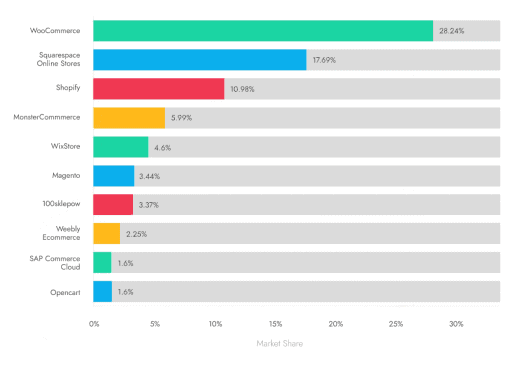
Today, a plethora of eCommerce frameworks exists in the market. Given the intense competition, these frameworks constantly innovate to introduce new features. However, which eCommerce platform is best for you depends on several factors, such as:
- Business model
- Selection of products
- Desire to grow bigger
- Team skill set
Let us look at the fourteen best eCommerce frameworks for your online business.
Best SaaS eCommerce Frameworks
Shopify

Shopify is a software platform designed for creating and managing online stores. Its robust and user-friendly features simplify the process of website creation and management. The platform is particularly advantageous for those looking to set up straightforward online stores with essential features.
As one of the largest and most renowned eCommerce platforms globally, Shopify powers over a million websites. While it isn’t a free platform, users might incur additional costs for certain non-native tools. Impressively, Shopify integrates seamlessly with over 4,100 apps and offers a plethora of customizable themes.
Salesforce Commerce Cloud
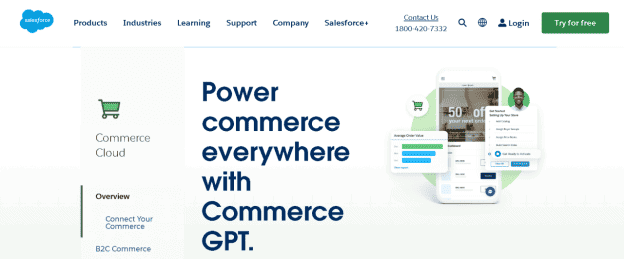
The Salesforce Commerce Cloud is designed to streamline omnichannel operations for eCommerce businesses. This platform consolidates sales from both physical and digital channels, offering a unified management experience. Additionally, its compatibility with AI systems further enhances store performance. A significant emphasis of the Salesforce Commerce Cloud is its focus on customization and personalization.
However, despite its array of beneficial features, it lacks integration with multiple agency partners. The platform can be complex, and building a store on it often necessitates the expertise of developers. The limited number of agency partners further restricts the available options for assistance.
HubSpot CMS
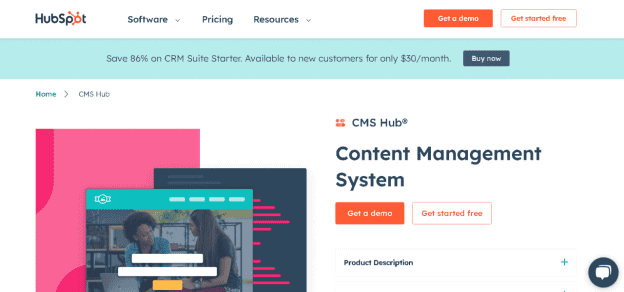
HubSpot CMS is a cloud-based website builder and blogging platform that integrates seamlessly with HubSpot CRM to fuel your online business growth. Equipped with tools tailored for both marketers and developers, it empowers users to craft responsive websites centered on enhancing customer experience.
Features include analytics, marketing campaigns, blogging capabilities, email management, SEO tools, and more. While HubSpot CMS offers a plethora of functionalities in its free package, even more advanced features are available in its premium tiers.
BigCommerce

BigCommerce stands out as a subscription-based platform noted for its flexibility compared to its counterparts. While there might be a steeper learning curve, its versatile tools can deliver potent online shopping features even without intricate web design.
One of BigCommerce’s significant advantages is its ease of integration with other platforms to enhance its functionality. Coupled with 24/7 global support, partnerships with over a thousand agencies, and seamless connections to online marketplaces, it positions itself as a top choice for launching and managing an online store.
Volusion

Volusion has long been a frontrunner among SaaS eCommerce platforms. Established in 2000, it has aided numerous prominent online stores in launching and developing their websites. Volusion offers a structured online business platform, complete with a shopping cart feature. With a mix of fundamental sales and marketing tools, it provides everything newcomers require.
Squarespace

Squarespace offers an intuitive framework that allows users to manage websites without relying on external developers or designers. It boasts responsive website templates and inventory tracking tools. Nevertheless, a thorough understanding of its features and functions is essential to efficiently oversee and expand your online business.
The platform isn’t without its limitations. For instance, it’s compatible with just four payment processors. Furthermore, their basic plan imposes a 3% fee on every successful transaction, which can lead to substantial costs for businesses with high sales volumes.
Wix

Wix is a software platform tailored for small businesses and stands out as a popular choice for online shopping due to its user-friendly drag-and-drop features. Beyond being an intuitive website builder, it offers hosting services, domain name registration, and customizable templates.
While you can set up a basic website on Wix for free, transitioning to an online store requires a premium plan. However, Wix lacks essential inventory management tools, such as low-stock alerts and integration capabilities with social commerce platforms.
Dynamics 365 Commerce

Dynamics 365 Commerce closely resembles the structure of a microservices CMS. This framework consists of several integrated applications that together offer a comprehensive solution for business management.
Catering primarily to medium and large enterprises, this platform is highly adaptable to specific business needs. It’s also capable of targeting various business segments simultaneously, making it an ideal eCommerce framework for complex enterprises or those with multiple vendors.
Best Open-Source eCommerce Frameworks
Zen Cart
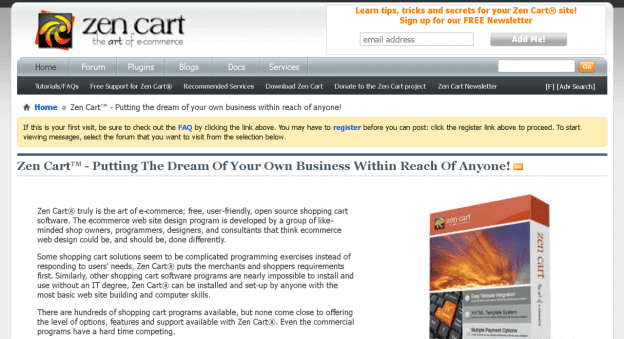
Zen Cart is a free, open-source platform designed to enable users to establish online stores. User-friendly and customizable, it was developed with those unfamiliar with computers in mind. The platform supports various payment methods and permits the use of community-created modules for payment processing.
WooCommerce

WooCommerce is a widely-used framework compatible with WordPress websites. Rich in features, it offers extensive customization options due to its open-source nature, enabling you to tailor a website to your preferences. Furthermore, it encompasses various tools to facilitate store management and ensures an efficient online shopping experience with stellar customer service.
However, WooCommerce does have some limitations. By default, it lacks certain conveniences, such as one-click checkouts, abandoned cart recovery, and streamlined payment and catalog management. Thankfully, these functionalities can be integrated into your online store using plugins and add-ons.
Magento Commerce
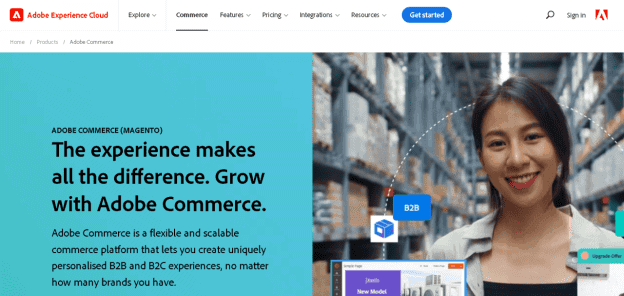
Magento, known by various names yet fundamentally the same, is built on an open-source eCommerce system that can be hosted either on personal servers or in the cloud. The platform is versatile and scalable.
Adobe Experience Cloud recently acquired Magento Commerce, so it’s now also referred to as the Adobe Commerce Platform. This allows it to integrate seamlessly with various Adobe eCommerce tools, including customer data platforms, analytics, and more.
Despite Magento boasting a vast community of adept developers, many businesses opt to transition away from it. The primary concern is the platform’s complexity, making website creation and management challenging, despite its robust features. Additionally, users must shoulder the responsibility of installing system updates and security patches since they only have control over their specific software instance.
PrestaShop
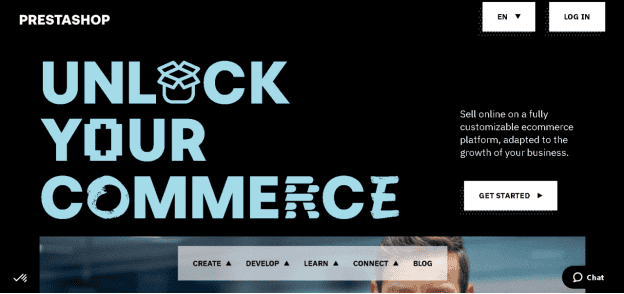
PrestaShop is a readily accessible platform that’s free to use. Developed in PHP and backed by the MySQL database management system, it currently powers 300,000 websites globally. However, like WooCommerce and Magento, it has its drawbacks. To integrate additional features, users need to buy add-ons or plugins, leading to added expenses over the initial cost.
Opencart

Opencart is a customizable platform for online stores that’s free to use. It accommodates over 20 payment methods and supports 8 distinct delivery options.
With a longstanding presence in the market, Opencart is the backbone for 400,000 active websites, attesting to its popularity and efficacy in site management. While downloading and using Opencart is free, enhancing your online store with advanced features such as themes, plugins, addons, and expert assistance comes at an additional cost.
Ecwid
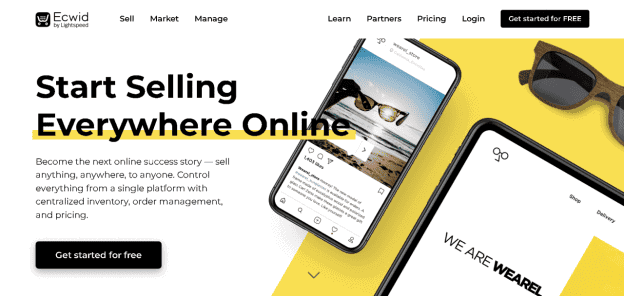
Ecwid is available for free and offers a convenient platform for selling products on your website, supporting multiple languages and currencies. Its ‘Instant Site’ feature provides an easy solution for eCommerce beginners to set up a one-page online store swiftly. However, it’s not without its shortcomings.
The SEO capabilities of Ecwid could use some enhancements. Its pricing is inconsistent across countries, and advanced product variation options are only accessible in the higher-priced plans.
B2B and B2C Platform Examples
eCommerce platforms can be sorted into different types, like B2B (Business to Business) or B2C (Business to Consumer), depending on their business models. Here are a few eCommerce platforms for different types of businesses:
| B2B eCommerce Platforms | B2C eCommerce Platforms |
| Shopify Plus | Etsy |
| Magento Commerce | eBay |
| WooCommerce | Amazon |
| Opencart | Netflix |
| Shift4Shop | Walmart |
| BigCommerce | Ecwid |
Choosing the Best eCommerce Framework: What’s the Right Option?
We have listed 14 best ecommerce frameworks, which are:
- Shopify
- Salesforce Commerce Cloud
- HubSpot CMS
- BigCommerce
- Volusion
- Squarespace
- Wx
- Dynamic 365 Commerce
- Zen Cart
- WooCommerce
- Magento Commerce
- PrestaShop
- Opencart
- Ecwid
While opinions on the best eCommerce framework may vary, we’ve compiled a list of top platforms. Upon close examination, it’s clear that each platform has distinct features tailored to address specific challenges and meet user needs.
You might wonder if it’s possible to establish an eCommerce website for free. Indeed, you can. While some platforms, both free and paid, might entail additional costs, others do not. Platforms like HubSpot CMS offer a basic free eCommerce solution, even including hosting. However, for greater flexibility and scalability options, it’s advisable to consider their paid plans.
FAQs
How secure are eCommerce frameworks?
Security largely depends on the framework itself, regular updates, and best practices followed by developers and businesses.
Can I migrate my existing online store to a different eCommerce framework?
Yes, many platforms offer tools and services for migrating data and design from one framework to another.
How customizable are these frameworks?
Customizability varies with the framework. Open-source solutions typically offer more flexibility, while SaaS solutions might have limitations but are often more user-friendly.
Do I need technical knowledge to set up an eCommerce platform?
While SaaS platforms are more beginner-friendly, open-source platforms might require some technical understanding or assistance.
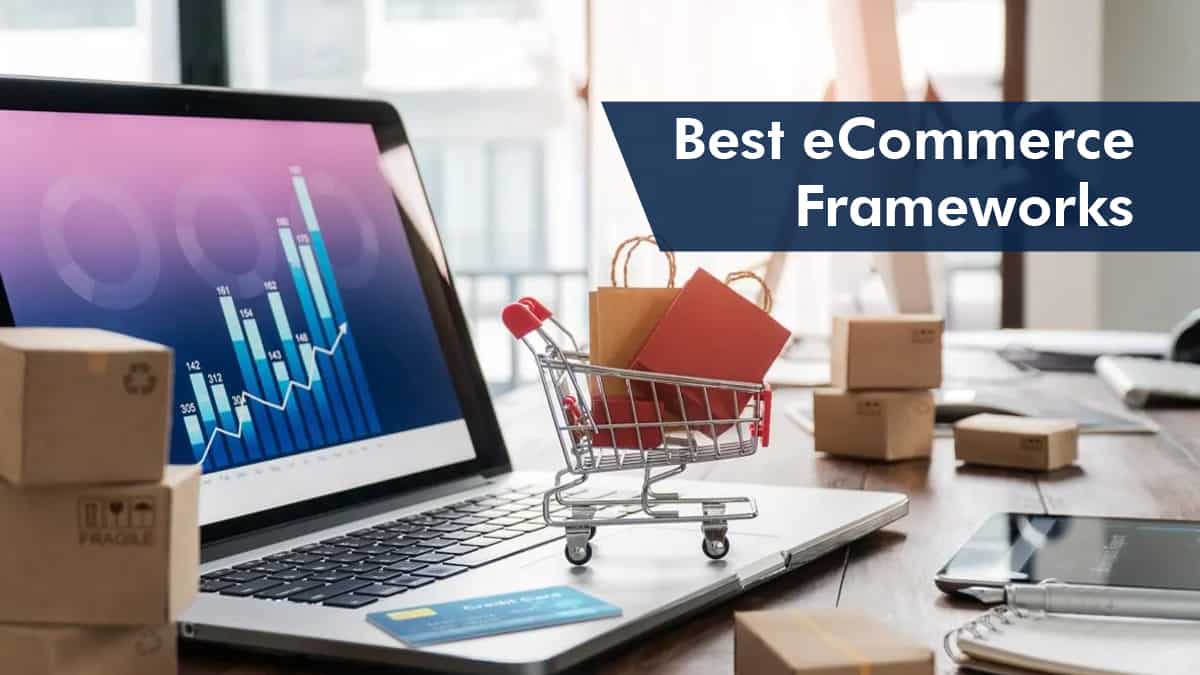








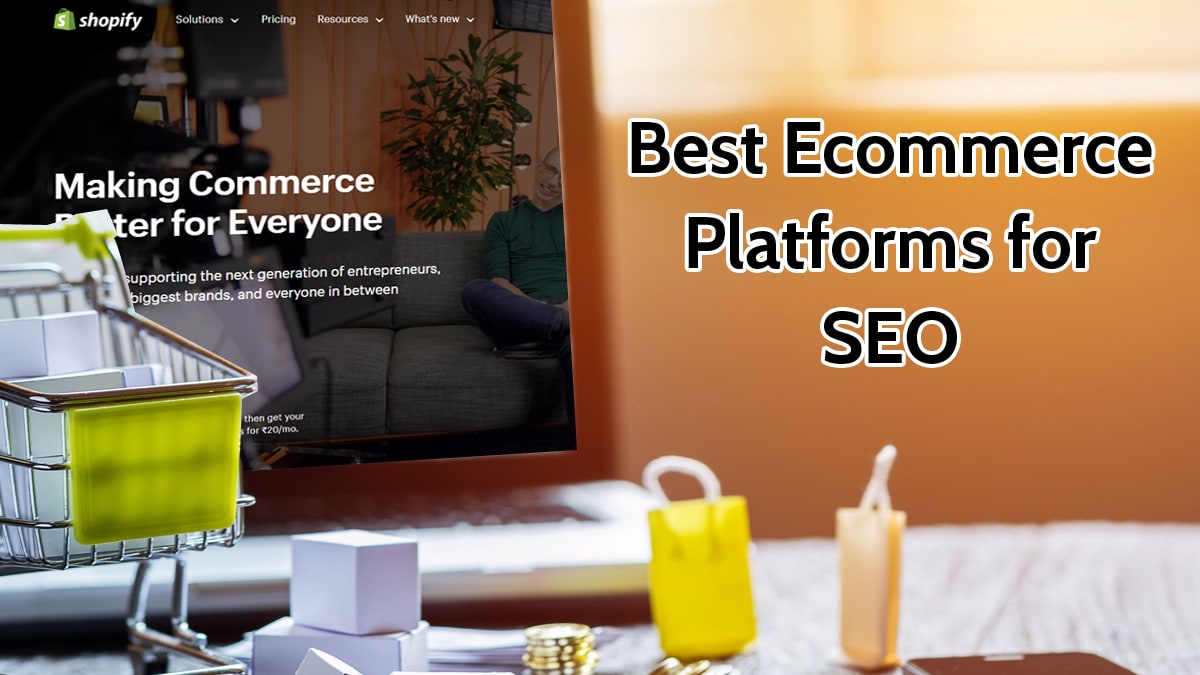
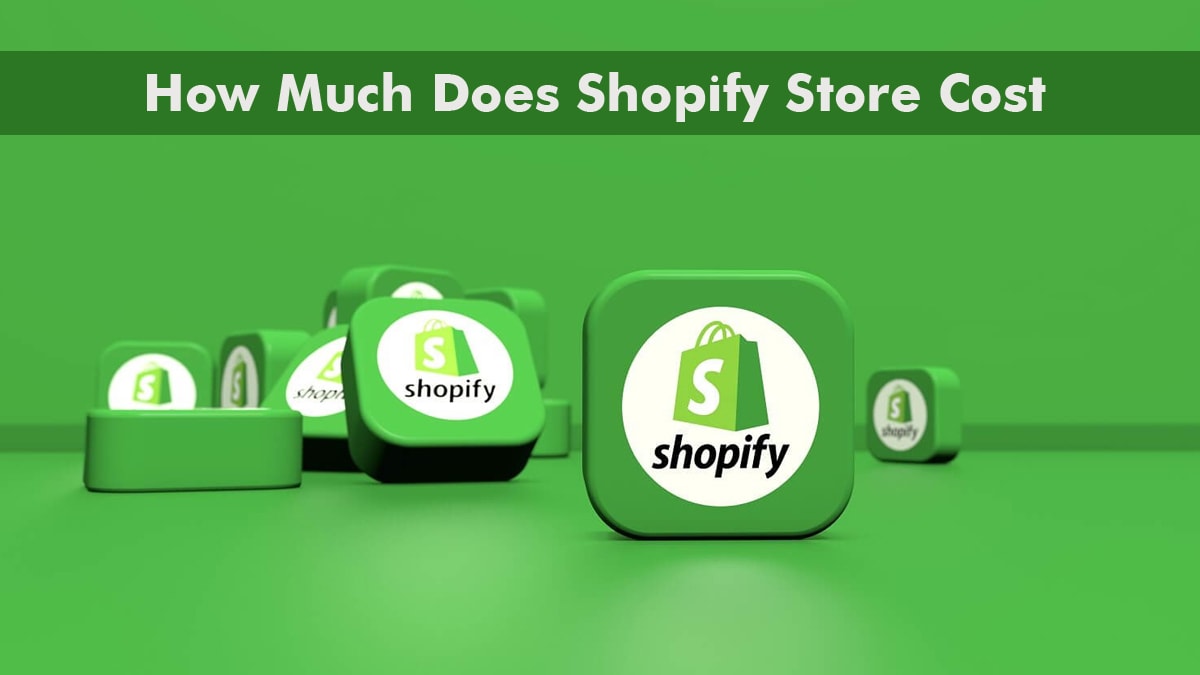
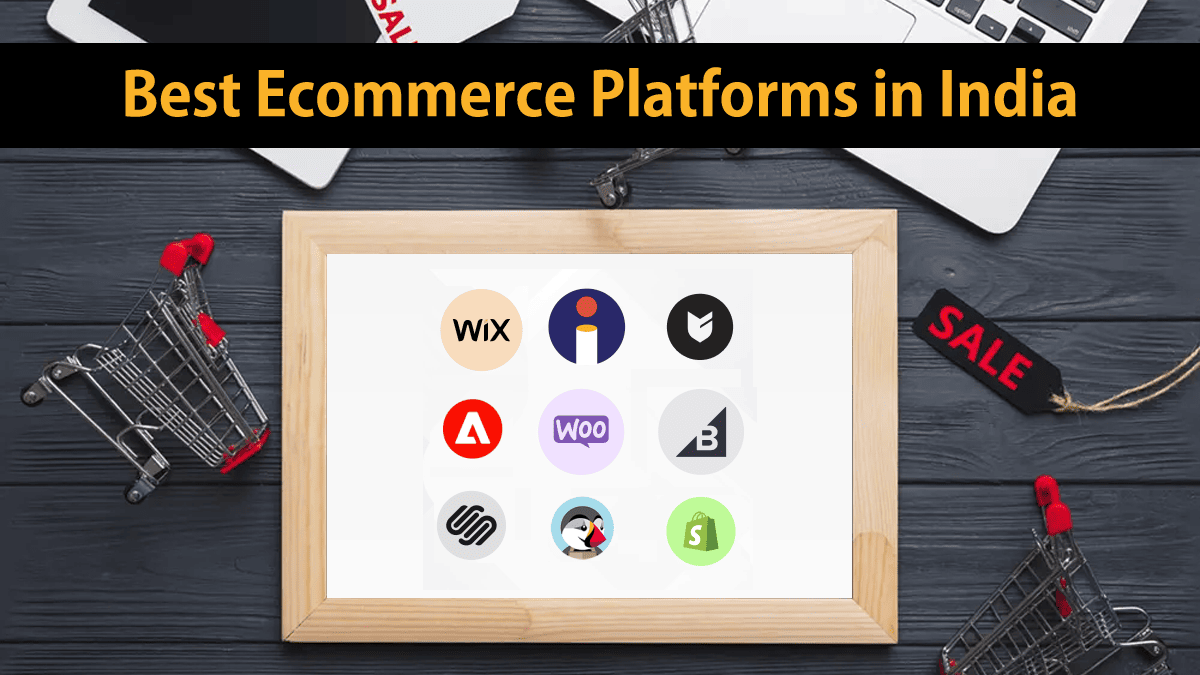

















 RSS Feeds
RSS Feeds